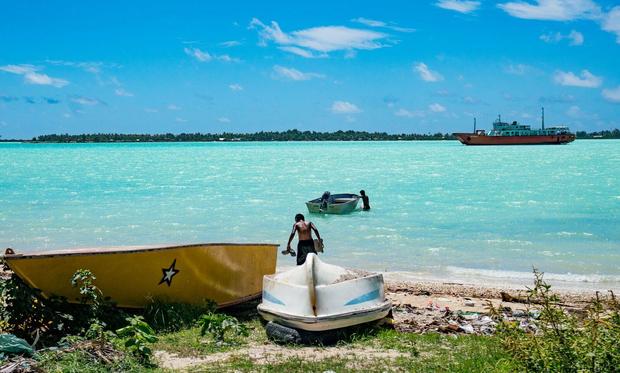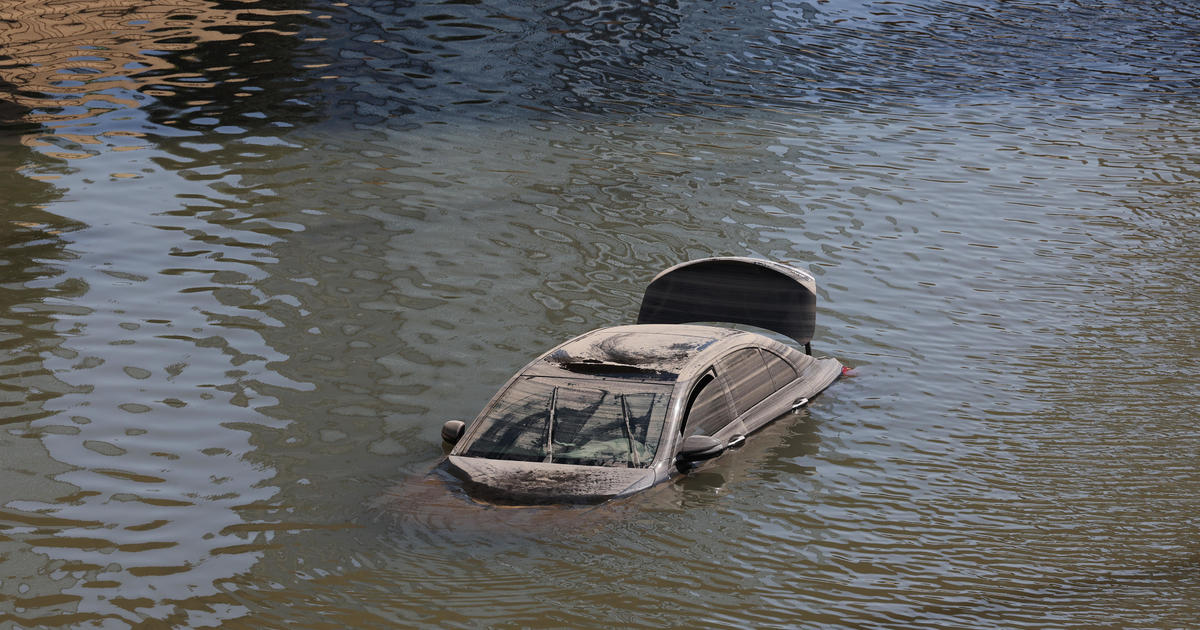Millions of future climate refugees may need protection, U.N. committee warns
Refugees fleeing their native countries due to the effects of the climate crisis in future years may not be forced to return if their lives are in danger, the United Nations Human Rights Committee said in a ruling Monday. The committee anticipates a flood of "millions" of climate refugees in the near future.
The first-of-its-kind ruling — which a U.N. official called "powerfully symbolic" —came in the case of Ioane Teitiota, who applied for protection in New Zealand in 2013. Teitiota claimed his family's lives were at risk in his home nation of Kiribati, a country severely threatened by rising sea levels. And while he actually lost his case, the U.N. committee took the opportunity to make a broader statement about climate refugees.
The situation in Tarawa, Teitiota's home island, "has become increasingly unstable and precarious due to sea-level rise caused by global warming," his counsel said. Saltwater contamination and overcrowding on the island have resulted in scarce freshwater resources and a growing housing crisis.
In 1947, South Tarawa was home to just 1,671 people. In 2010, its population surpassed 50,000 after nearby islands became uninhabitable. By 2017, Kiribati's population had soared to over 100,000 people.
Additionally, storm surges and high tides have flooded residential areas. The population of the island suffers from vitamin deficiencies, malnutrition, fish poisoning and other ailments resulting from food insecurity. Unemployment has surged in the region and diseases spread easily through overcrowding and poor quality drinking water.
"Kiribati has thus become an untenable and violent environment for the author and his family," the case argued. Scientists warn it could become uninhabitable within decades.
Teitota applied for refugee status in New Zealand after his visa expired in 2010. He was forced to return to Kiribati in September 2015 — putting his life and the lives of his family at risk, he said.
Teitota's application was rejected, but he appealed, claiming the ruling violated his right to life. New Zealand's Court of Appeal and Supreme Court each denied subsequent appeals, so he filed a complaint with the U.N.'s Human Rights Committee.
On Monday, the U.N. committee issued its judgment in the case. It ruled against Teitota — stating his life was not in immediate risk — but said that people in places where climate change poses an immediate threat to their lives could not be forced to return.
"The timeframe of 10 to 15 years, as suggested by the author, could allow for intervening acts by the Republic of Kiribati, with the assistance of the international community, to take affirmative measures to protect and, where necessary, relocate its population," the ruling said.
In the future, if the climate crisis continues, governments may be prohibited from sending people back to home countries that pose immediate threats to life due to climate change, the committee held, and potential human rights violations caused by climate change should be taken into account by nations considering the deportation of asylum seekers.
"Without robust national and international efforts, the effects of climate change in receiving states may expose individuals to a violation of their rights," the ruling said, citing articles 6 and 7 of the International Covenant on Civil and Political Rights, ensuring people's inherent right to life.
While Kiribati's current situation was not enough to meet the standards of an immediate threat to life, the decision could become significant as the number of climate refugees is projected to increase.
"The decision sets a global precedent," said Kate Schuetze, Pacific researcher at Amnesty International. "It says a state will be in breach of its human rights obligations if it returns someone to a country where — due to the climate crisis — their life is at risk, or in danger of cruel, inhuman or degrading treatment."
However, the ruling "would not apply to U.S. asylum decisions at this point, because the court ruled against the claimant," reports CBS News' Pamela Falk, "but it opens the door to courts hearing climate claims in the future."
"It is powerfully symbolic," a U.N. official told Falk.
The U.N. expects tens of millions of people to be displaced due to the climate crisis in the next decade alone. A 2018 World Bank report predicted that 143 million people from South Asia, Latin America and Sub-Saharan Africa could be forced to migrate due to climate conditions by 2050.
"The message is clear: Pacific Island states do not need to be underwater before triggering human rights obligations to protect the right to life," said Schuetze.
At the World Economic Forum in Davos on Tuesday, United Nations High Commissioner for Refugees Filippo Grandi told Reuters that the ruling has broad implications for governments.
"The ruling says if you have an immediate threat to your life due to climate change, due to the climate emergency, and if you cross the border and go to another country, you should not be sent back, because you would be at risk of your life, just like in a war or in a situation of persecution," Grandi said.
Wildfires, rising sea levels, crop destruction and floods are just a few of the results of the climate crisis that could drive large numbers of people from their homes.
"We must be prepared for a large surge of people moving against their will," he said. "I wouldn't venture to talk about specific numbers, it's too speculative, but certainly we're talking about millions here."





